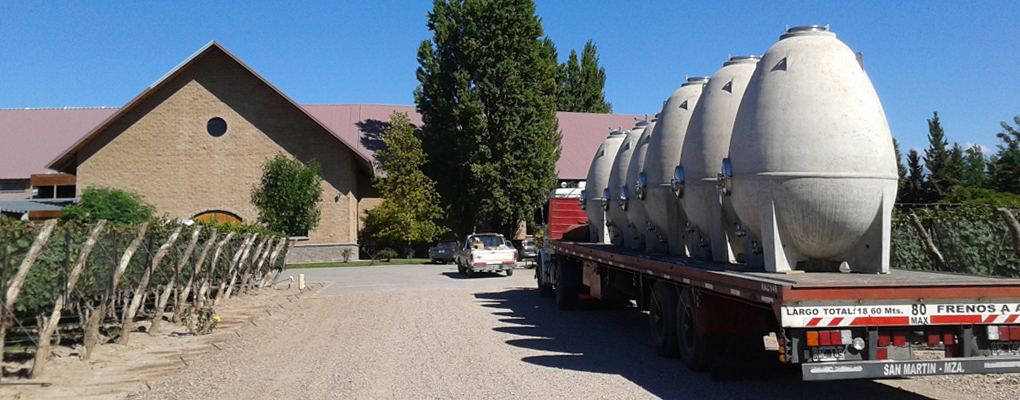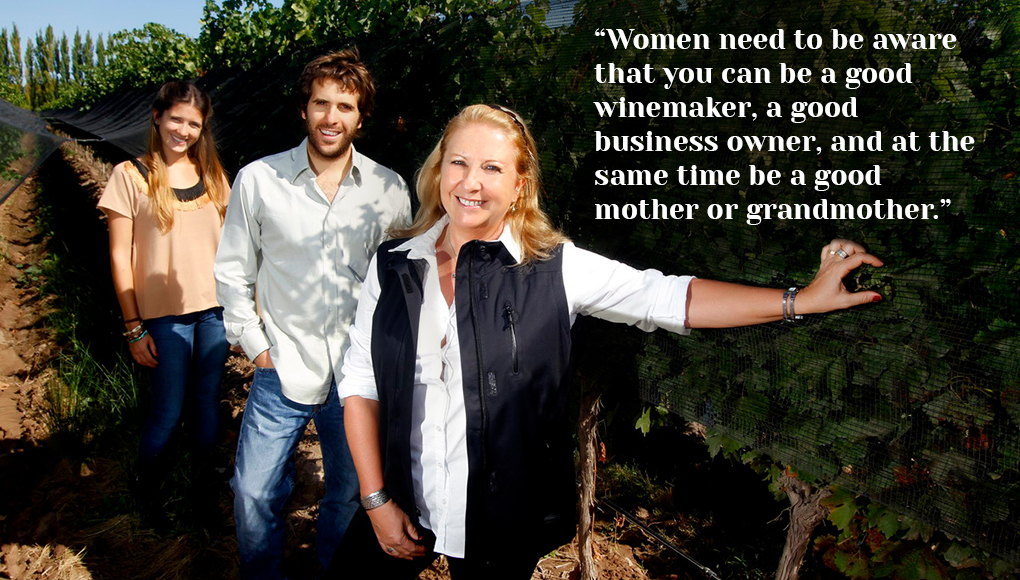In 2018, we kicked off a new editorial series titled “Women in Wine,” with the goal to highlight the incredible women who are making changes in the global wine industry as well as their communities.
To do this, we interviewed sustainability specialists and master blenders. We profiled CEOs and company vice presidents, along with winemakers whose craft, passion and knowledge are shaping the wines we pour today.
It seemed fitting to close out our first year of “Women in Wine” with Susana Balbo, a woman who has dedicated her life to serving as an advocate for her wine community, her country — and women around the world.
Susana Balbo, the Winemaker
Balbo’s long list of achievements in the wine industry has made her a superhero in the wine world. To start, she was the first female winemaker in Argentina to graduate with a master’s degree in winemaking. And she did so while maintaining the highest GPA of her class, earning her a gold medal from the Universidad Juan Agustin Maza.
After graduating, she became Argentina’s first female enologist and spent the next 20 years working as a consulting winemaker, establishing herself as one of Argentina’s best.
In 2000, Balbo founded her own wine brand, Susana Balbo Wines, and in 2001 she broke ground for her winery in Mendoza.
During this time Balbo became an advocate for growing Argentina’s prominence in the global wine industry. People were complaining about the lack of Argentinian wine in the export market, so Balbo decided to do something about it.

“Everybody was complaining, but no one was willing to step up and get involved,” said Balbo. “We needed to make the world aware of our wines and so I put some bottles in my handbag and knocked on doors out in the global market. I had to show the world what we’re able to do.”
Balbo’s hard work and leadership paid off. In 2006 her peers elected her as the President of Wines of Argentina, an organization that promotes the country's wine industry to a global market. Balbo was reelected two more times, holding the position for more than a decade until stepping down to take on a new challenge: political corruption.
The Voice for Political Change
In 2015, Balbo decided to step away from the vineyards and day-to-day life as a winemaker to focus instead on solving the social and economic problems in her home country.
“My conviction at the time was that, if the previous government wins again, I was going to sell my business and leave the country,” said Balbo. “I was convinced that the corruption in Argentina was so deep that there was no way I could keep on living there unless something drastic happened.”
Something drastic did happen. Balbo decided to run for congress.
Balbo didn’t have any previous political experience, and she was proud of that. She wasn’t a career politician. Instead, she was a business owner who took great pride in her responsibility to pay, on the first day of every month, the salaries of 120 people working for her; an owner who understood that her employees have other necessities outside of their jobs. She was someone who recognized that she wasn’t just responsible for her employees, but for their families as well.
“Politicians, they don't know that. They live in their own bubble. They are a corporation. Their intent is to feed themselves, to survive in this bubble,” Balbo said. “If I was going to make real change I had to do so from the inside.”

Many people run for congress just to have power. I never wanted power. I ran for congress to make change happen.
- Susana Balbo

Balbo won the election and was appointed National Deputy for the province of Mendoza in Argentina’s National Congress. Once inside however, she realized just how difficult it was going to be to implement change and influence others. The Congress of Argentina consists of 72 elected senators and another 257 Chamber Deputies. There are a lot of hands grappling for control, but in all actuality the real power was held by a select few.
“For me, it was a very frustrating experience,” she said.
Sensing Balbo’s growing uneasiness with the situation at home, President Mauricio Marci appointed her to Women 20 (W20), a transnational network of women leaders with the goal to increase women’s involvement in their respective countries’ economies and societies.
Her new W20 responsibilities rekindled Balbo’s passion for advocacy. Balbo represented Argentina all over the world and soon she was spending most of her time traveling internationally to Japan, Saudi Arabia and Thailand.
Her increase in travel also meant that she was spending less time at home in Argentina. Knowing that she could no longer give all her energy to both her government seat and her W20 appointment, she decided to resign from congress.
“It was impossible for me to be a congresswoman and continue to do W20 as well,” said Balbo.
When asked why she felt she needed to resign, Balbo explained that her party was the minority in congress. Her missing a day, and in turn missing a vote, could be the difference between securing a crucial new law or seeing it fall to the floor.
“Many people run for congress just to have power. I never wanted power. I ran for congress to make change happen,” Balbo said.
The Advocate
By 2017, Balbo was fully invested in W20. She now represented Argentina at all Troika meetings, in addition to regular conferences with the Inter-American Development Bank in Washington, D.C., labor inclusion roundtables in New York City and lectures on digital inclusion for women at workshops in London and Japan.
Balbo’s dedication was recognized in December of that year when she was named Chair of W20 Argentina. (The 2018 Summit was held in Argentina in October.)

When we spoke to Balbo this past fall she was unable to share the W20 policy recommendations and actions plans she was working on, as they had yet to be officially announced. She did, however, reveal some of the global issues W20 planned to take on — for example, the lack of financial inclusion for women from rural areas.
According to Balbo, 40 percent of the women in Argentina live in rural areas. Only 25 percent of those women have formal jobs and receive a formal salary. The rest survive in an informal economy without sick time, a proper salary or health care.
“Women leave their rural towns and move to the cities to make a better life for themselves and their families. Often however, they end up in even worse conditions as city government have yet to address the services people need,” said Balbo. “I had always thought that this was a problem of Argentina, but it’s not just there. It’s happening in India, in Mexico and in Brazil.”
The other issue is one of technology.
According to W20, across the globe more than 250 million fewer women than men use have access to the internet. Another 200 million fewer women than men have access to mobile phones. In today’s world, having no access to technology is a barrier to social integration and this gender gap highlights just two of the obstacles blocking women’s economic empowerment.
Balbo and the rest of W20 believe that being a part of the digital world is an essential attribute that women need to enter the workforce and improve their quality of life.
“Digital inclusion is global problem and one we are working to propose concrete actions to impact,” Balbo said. “We need these proposals and plans to be concrete, otherwise G20 is doing to devolve into a place where everyone is trying to arrive at a new policy, but nobody is taking action. We need more than policy, we need action.”
On October 3, 2018, Balbo and her team presented a total of four proposals to W20: Labor inclusion, digital inclusion, financial inclusion and rural development.
The Mother
Despite all her success and national notoriety, Balbo remains modest. She recognizes that her path could have gone quite differently if she wasn’t so fortunate early on in her career.
“I was really lucky that when I decided to start a family I was working for a winery owner who allowed me to bring my kids with me to the winery,” Balbo said. “Every half hour, I’d stop what I was doing to look after them, feed them or change them.”
“I was very, very lucky to have this opportunity mainly because it was a small winery, in a small town and everything—including the vineyards—were close together. Today, things are very different, and I think it would a be too difficult to both have a child and be a winemaker out in the fields,” said Balbo.
Knowing just how fortunate she was, Balbo has made it one of her chief missions to address the issues of and contradictions of traditional family responsibilities.
“Men—and companies—need to be more aware that families are a shared responsibility,” said Balbo. “We need more parental time for new parents, especially in that first year. We’re starting to see some changes thanks to an increase in education and awareness, but we’re fighting a strong cultural bias, and even stronger traditions.”
The Role Model
It is probably clear by now that Balbo is a woman who never stops. So with the W20 2018 Summit in the books, Balbo has set her sights on a few new passion projects.
For starters, she is working with government officials and financial institutions in Argentina to establish a co-working space tailored to women, complete with proper security, the latest technology, and childcare options—a place where mothers can work knowing that their kids next door are being properly looked after.

Balbo is also looking forward to spending time with her own family. Both of her children now work at the winery, and she is eager to get back to them, as well as her three grandchildren.
“I plan to keep advocating for women, but it will be less intensive now,” Balbo said. “Women need to be aware that you can be a good winemaker, a good business owner, and at the same time be a good mother or grandmother,” Balbo said. “It's my duty to give back and make women more aware of that.”
Balbo has one last, long-term goal she hasn’t yet taken on. She’d like to write a book. The premise?
“How to achieve in your life what you never dreamed you could. I think it could be a novel.”
This interview has been edited and condensed for clarity. To learn more about the action plans for Balbo’s W20 proposals, visit http://w20argentina.com.
This story is part of our award-winning “Women in Wine” series, our long-running effort to highlight winemakers, sustainable specialists, executives, and others making a positive impact in the world of wine.
To learn more, please visit https://en.susanabalbowines.com.ar/.